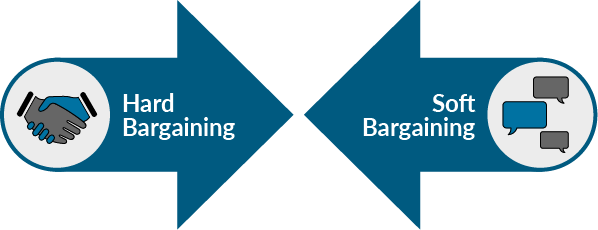Hard vs. Soft Bargaining
Developing advanced negotiation skills enables leaders and managers to effectively address conflicts, come to agreements, and make decisions that align with the best interests of their organization. Leaders who are skilled negotiators can foster consensus, sustain relationships, and establish mutually beneficial outcomes.
In the world of business, negotiation skills are crucial to achieving success. Whether you’re negotiating with suppliers, customers, or colleagues, securing the best possible deal is essential. However, the approach you take to negotiation can vary. Do you take a hard bargaining approach, driving a tough bargain to secure the best price? Or do you opt for a softer approach, compromising some ground to build rapport and establish long-term relationships?
There’s no one-size-fits-all answer to this question. The most effective approach depends on the specific situation. Generally speaking, hard bargaining is more effective when dealing with unknown parties or one-off transactions. On the other hand, a softer approach is better suited to situations involving people you know or where building long-term relationships is important.
That being said, there are many factors to consider when deciding whether to take a hard or soft bargaining approach. Let’s explore this topic further.

What is hard bargaining?
Hard bargaining is a negotiation approach that prioritizes achieving the most advantageous deal possible. Those who use this style are willing to put relationships at risk in order to secure the best price or terms. To be effective, hard bargainers must possess extensive knowledge of the negotiation subject, as well as a high level of comfort with conflict. Additionally, they should be ready to walk away from the negotiation if their goals are not met.
What is soft bargaining?
Soft bargaining is a negotiation style characterized by a focus on building relationships. Soft bargainers are more concerned with finding a win-win solution that meets everyone’s needs. To be successful, soft bargainers need to be good at building rapport and empathizing with the other party. They also need to be patient and prepared to make some concessions.
Which is better?
Determining the best approach to negotiation is not a straightforward matter and is dependent on the specifics of the situation at hand.
If you are negotiating with someone you are unfamiliar with or have no prior relationship with, employing a hard-bargaining approach may be the most effective. Establishing trust and rapport may be difficult, so the focus is on securing the best possible deal.
On the other hand, when negotiating with someone you know or wish to cultivate a long-term relationship with, adopting a soft bargaining approach may be more appropriate. In these instances, it’s about building trust and rapport to find mutually beneficial solutions.
However, there are exceptions to these general guidelines. For example, if you are dealing with a supplier who is eager for your business, a hard-bargaining approach may result in a better deal. Similarly, if you are negotiating with a customer who is particularly price-sensitive, employing a harder approach may be necessary.
It is worth noting that in some cultures, hard bargaining is the norm, and soft bargaining may be viewed as weak or ineffective. In these situations, it may be necessary to adopt a harder approach, even when dealing with people you wish to maintain a long-term relationship with.